语法导学案
M1 U1语法导学案

高三英语一轮复习导学案编号:003 使用时间:2010-7-9 编写人:李猛苍王苗苗刘聪聪郑德旺审核人:审批人:班级:小组:姓名:组内评价:教师评价:M1 U1 Lifestyles 语法专题导学案学习目标:1.复习并进一步掌握一般现在时、现在进行时及一般将来时的用法。
2.在讨论协作的基础上处理并解决导学案上自己的问题,进一步提高团队协作能力。
3.全力以赴,全情投入,体验学习的乐趣。
Step1 复习回顾:用括号里的动词正确形式填空:1.The earth ________(move) around the sun.2. He ________(work) in a factory in 1986.3. It is ten years since we ________(leave) college.4. If you ________(come) this afternoon, we _______________ (have)a meeting.5. Without air a living thing ______________(die).6. Don’t believe him. He is always _______(tell) lies.7. The foreign teacher is ____________(arrive) on Monday.Step2 Present Simple(一般现在时)的用法【用法】①表示经常性、反复性和习惯性的动作、行为等。
常用的时间状语有:often/sometimes/usually/always/seldom/in the morning/every day/on Sunday等。
【应用】(翻译)____________________ in the morning. 我经常早上六点上学。
【用法】②表示客观事实,普遍真理。
注:在含宾语从句的复合句中,尽管主句用过去时态,但如果宾语从句所述内容是客观真理,从句谓语动词仍用一般现在时。
必修4unit3语法导学案
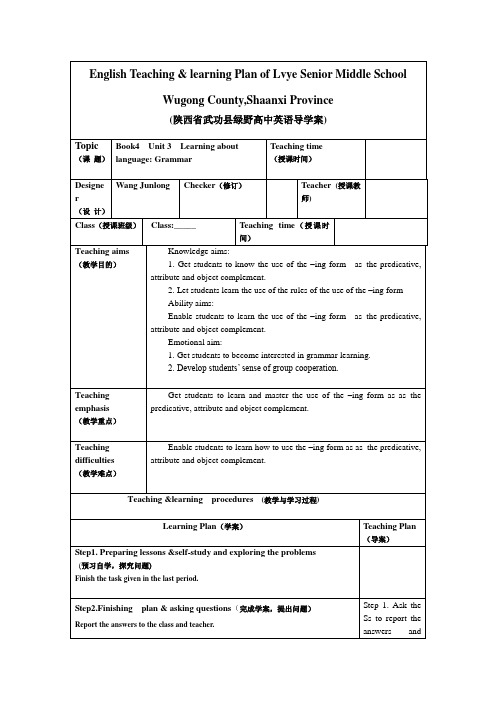
The woman standing over there is our English teacher.
The house being built (=which is being built) now will be our new library.
The news is very exciting.(How is the news?)
具体区别可见下表:
表1-2作定语时的区别:
表1.
名称
形式
位置
内容
时间
现在
分词
单个分词或分词短语均可(相当于adj)。
前后
均可
与所修饰的词有逻辑上的主谓关系,说明所修饰词的特征或主语所处的状态。
主动形式与主句谓语动词的动作同时发生;被动形式在主句谓语动词之前发生。
A. forced B. forcing C. to be forcedD. having forced
【解析】现在分词短语作后置定语,修饰new laws ,相当于which forces ……...故选B。
5.There isa great deal of evidence _____that music activities engage different parts of the brain. (浙江)A. indicateB. indicatingC. to indicateD. to be indicating
动名词
仅仅是单个形式出现(相当于n)。
在所修饰词之前
一般表示所修饰词的用途。无主谓关系。
初中英语人教版七年级下册语法课(Grammar)导学案
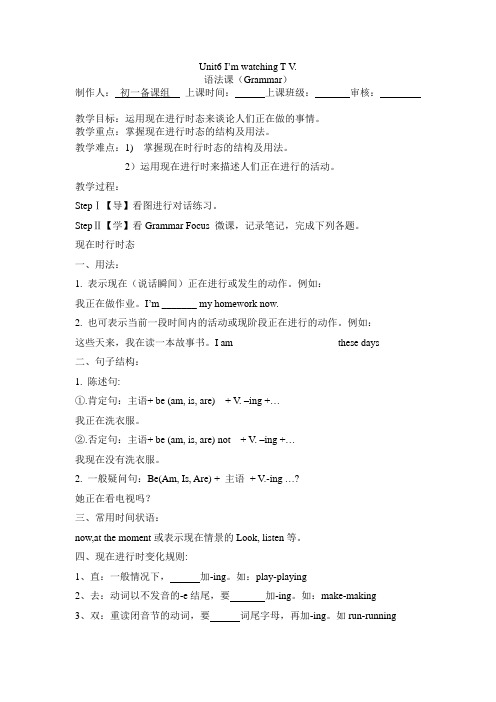
Unit6 I’m watching T V.语法课(Grammar)制作人:初一备课组上课时间:上课班级:审核:教学目标:运用现在进行时态来谈论人们正在做的事情。
教学重点:掌握现在进行时态的结构及用法。
教学难点:1) 掌握现在时行时态的结构及用法。
2)运用现在进行时来描述人们正在进行的活动。
教学过程:StepⅠ【导】看图进行对话练习。
StepⅡ【学】看Grammar Focus 微课,记录笔记,完成下列各题。
现在时行时态一、用法:1. 表示现在(说话瞬间)正在进行或发生的动作。
例如:我正在做作业。
I’m _______ my homework now.2. 也可表示当前一段时间内的活动或现阶段正在进行的动作。
例如:这些天来,我在读一本故事书。
I am ____________________ these days二、句子结构:1. 陈述句:①.肯定句:主语+ be (am, is, are) + V. –ing +…我正在洗衣服。
________________________________②.否定句:主语+ be (am, is, are) not + V. –ing +…我现在没有洗衣服。
________________________________2. 一般疑问句:Be(Am, Is, Are) + 主语+ V.-ing …?她正在看电视吗?______________________________三、常用时间状语:now,at the moment或表示现在情景的Look, listen等。
四、现在进行时变化规则:1、直:一般情况下,加-ing。
如:play-playing2、去:动词以不发音的-e结尾,要加-ing。
如:make-making3、双:重读闭音节的动词,要词尾字母,再加-ing。
如run-running4、变:以-ie结尾的动词,把-ie y,再加-ing。
如:lie-lyingStepⅢ【练】写出下例动词的现在分词形式。
Module2Trafficjam语法学案导学案.doc

Module 2 Traffic jam语法学案导学案带主语的祈使句常用于下面几种情况:(1)当说话人要求不同的人做不同的事时。
如:You go to telephone the police for help while Mary and I stay here to look after the injured.(2)当说话人是上级对下级、或长辈对晚辈时。
女口:You listen to your parents at home. ________________________________ .⑶当祈使句的谓语部分有副词up, down, in, out, off, away,且副词位于句首时。
如: Out you go. __________________ .三、对祈使句的应答语的考查1.■一Don^t forget to come to my birthday party tomorrow・A」don't B.I won't C.I can't D J haven't2.——Write to me when you get home・A. 1 mustB. 1 shouldC.I willD.I can対策:从语句交际意义入手,排除DonWo/Be等应答的定式干扰.Step II. Exercise Zone(考练空间)1.-I can't reach that high. What shall I do?-______ John to help you.A. AskB. askingC. to askD. please2.Dad, let us, ___ , go to the river -side, _________ ?A. Tom and I ; shall weB. Tom and me; shall weC. Tom and I ; will youD. Tom and me; will you3・ ___ and I will hit you.A. If you say that again B・ Say that againC・ Saying that again D・ You will say that again4-.I can?t unlock the door.-______ the key the other way.A. Try to turnB. Try turningC. Trying to turn D・ Trying turning5.____ and I'll get the work finishedA. Have one more hour.B. one more hourC・ Given one more hour D. If I have one more hour・6.If you have a job __________ y ourself to it and finally youll succeed.A ・ do devoteB ・ don't devote C. devoting D. not devoting一But I fed it yesterday.A. do youB. will youC. didn't youD. don" you18.—Be sure to get there on time, __ you?一Of course. We ___ ・A. will; willB. won't; shallC. don't; doD. can; swim19 —The new windows need washing・—Well, lets wash them together, ____ ?A. shall weB. will youC. should weD. would you20. Sorry, Fm not feeling well and I don^t think I can finish. 一Don't worry. Let us do it for you, ?A. will youB. shall weC. shan't weD. shall youBook 4 Module 2 语法答案:You go and tell him, Tom.请这边坐。
专题04 复句(导学案)-高中语文现代汉语语法系列讲与练
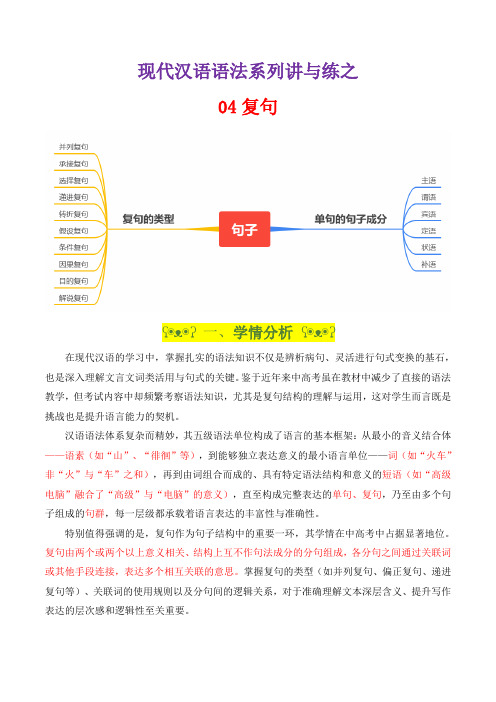
现代汉语语法系列讲与练之04复句ʕ◉ᴥ◉ʔ一、学情分析ʕ◉ᴥ◉ʔ在现代汉语的学习中,掌握扎实的语法知识不仅是辨析病句、灵活进行句式变换的基石,也是深入理解文言文词类活用与句式的关键。
鉴于近年来中高考虽在教材中减少了直接的语法教学,但考试内容中却频繁考察语法知识,尤其是复句结构的理解与运用,这对学生而言既是挑战也是提升语言能力的契机。
汉语语法体系复杂而精妙,其五级语法单位构成了语言的基本框架:从最小的音义结合体——语素(如“山”、“徘徊”等),到能够独立表达意义的最小语言单位——词(如“火车”非“火”与“车”之和),再到由词组合而成的、具有特定语法结构和意义的短语(如“高级电脑”融合了“高级”与“电脑”的意义),直至构成完整表达的单句、复句,乃至由多个句子组成的句群,每一层级都承载着语言表达的丰富性与准确性。
特别值得强调的是,复句作为句子结构中的重要一环,其学情在中高考中占据显著地位。
复句由两个或两个以上意义相关、结构上互不作句法成分的分句组成,各分句之间通过关联词或其他手段连接,表达多个相互关联的意思。
掌握复句的类型(如并列复句、偏正复句、递进复句等)、关联词的使用规则以及分句间的逻辑关系,对于准确理解文本深层含义、提升写作表达的层次感和逻辑性至关重要。
因此,针对当前学情,学生应在学习语法基本常识的基础上,特别加强对复句结构的分析与练习。
通过大量阅读积累语感,结合语法规则分析复句结构,理解分句间的内在联系,从而不仅能在考试中准确辨析病句、灵活应对句式变换题,更能在日常学习和写作中运用自如,提升整体语言素养。
语法作为初高中知识的衔接,我们重点要讲解的也是“词”“短语”“句子”和复句的基本知识。
这次讲的是“复句”专题。
ʕ◉ᴥ◉ʔ二、知识讲解ʕ◉ᴥ◉ʔ一、单句与复句区别1.什么是单句?单句是一个独立的语言单位,它由一个或多个短语(包括词)构成,拥有特定的语调,能够完整表达一个思想或意思,无需依赖其他句子来理解其意义。
语法 完全倒装 导学案

Full Inversion导学案完全倒装--不走寻常路!Step I. Warming-up (Super Brain)Task two: Read aloud and discuss what these sentences have in common.Step III. Consolidation1. 这次机会如此难得,你最好不要错过。
(miss)So precious________________________________________________________________.2. 下面是一些发布在网络上关于如何提高英语口语的建议。
(post)Below_________________________________about how to improve your spoken English.3. 中国十大城市之一的重庆位于扬子江和嘉陵江交汇的地方。
(lie)At the meeting place of the Yangtze River and the Jialing River_______________________.4. 一位浑身是血的老人就躺在公汽前。
(lie; cover)Just in front of the bus_______________________________________________________.5. Group work: Read the following materials aloud and then polish the underlined sentences.Step IV. Appreciation: see how full inversion is used in songs and literary works.1. The Rose (by Westlife)Some say love it is a river that drowns the tender reed.Some say love it is a razor that leaves your soul to bleed.Some say love it is a hunger and endless aching need.I say love it is a flower and you its only seed.It's the heart afraid of breaking that never learns to dance.It's the dream afraid of waking that never takes the chance.It's the one who won't be taken who can not seem to give.And the soul afraid of dying that never learns to live.When the night has been too lonely and the road has been too long.And you think that love is only for the lucky and the strong.Just remember in the winter far beneath the bitter snowLies the seed that with the sun's love in the spring becomes the rose.2.A chapter from The Adventures of Oliver Twist by Charles Dickens"Stop thief! Stop thief!" There is a magic in the sound. The tradesman leaves his counter; the butcher throws down his tray; the baker his basket; the milkman his pail; the school-boy his marbles; the child his battledore. Away they run, tearing, yelling, screaming, knocking down the passengers as they turn the corners, waking up the babies, and astonishing the dogs: and streets, buildings and squares re-echo with the sound."Stop thief! Stop thief!" The cry is taken up by a hundred voices, and the crowd accumulateat every turning. Away they fly, splashing through the mud, along the pavements. Up go the windows, out run the people, onward moves a whole audience desert.There is a passion for hunting--something deeply implanted in the human breast.Stopped at last! A clever blow. He is down upon the pavement; and the crowd eagerly gather round him, each new comer, jostling and struggling with the others to catch a glimpse. ''Stand aside!'' ''Give him a little air!'' ''Nonsense! He doesn't deserve it.'' ''Where's the gentleman?'' ''Here he is, coming down the street.'' ''Make room for the gentleman!'' ''Is this the boy, sir?'' "Yes,'' said the gentleman, ''I am afraid it is the boy.''''Afraid!' murmured the crowd. ''That's a good...''''Poor fellow!'' said the gentleman, ''he has hurt himself.''''I did that, sir,'' said a fellow, stepping forward, ''I stopped him, sir.''But, the old gentleman, eyeing him with an expression of dislike, made his way through the crowd, and seized Oliver by the collar.Notes for reference1. tender /'tendə/ adj. 1. kind, gentle and loving;2. (of food) easy to bite through and cut;2. evil /'i:v I l/ adj. 1. (of people) enjoying harming others; morally bad and cruel; 2. having a harmful effect on people;3. extremely unpleasant;3. uneasy /∧n'i:z I/ adj. 1. feeling worried or unhappy about a situation because you think sth bad or unpleasant may happen; 2. that does not enable you to relax or feel comfortable;4. gay /ge I/ adj. 1. (old-fashioned) happy and full of fun; 2. (old-fashioned) brightly colored;5. bitter /'b I tə/ adj. 1. (of weather conditions) extremely cold and unpleasant; 2. (of food, etc.) having a strong, unpleasant taste; not sweet; 3. (of people) feeling angry and unhappy;6. Tender is the night: the fourth and final novel completed by F. Scott Fitzgerald.7. Uneasy lies the head that wears a crown: from Henry IV by William Shakespeare.8. Gone are the days when my heart was young and gay: a line from an American ballad Old Black Joe written by Stephen Collins Forest in 1860.。
高一英语 语法“主语+ 谓语+ 宾语+ 宾语”句型导学案 新人教版
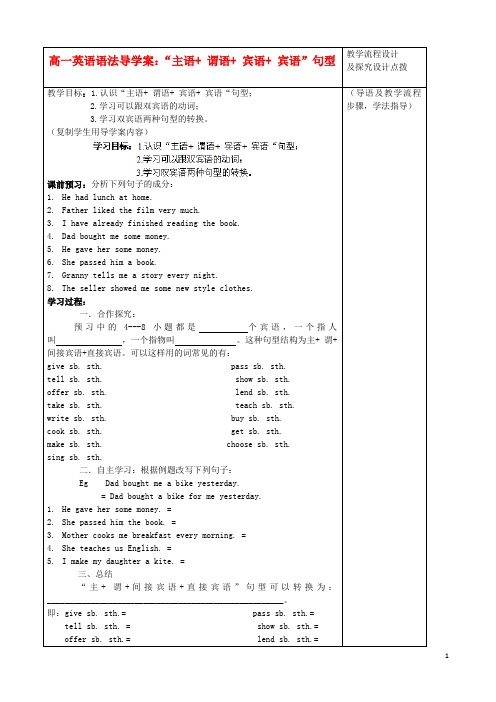
5.I make my daughter a kite. =
三、总结
“主+谓+间接宾语+直接宾语”句型可以转换为:______________________________________________________。
即:give sb. sth.= pass sb. sth.=
offer sb. sth. lend sb. sth.
take sb. sth. teach sb. sth.
write sb. sth. buy sb. sth.
cook sb. sth. get sb. sth.
make sb. sth. choose sb. sth.
sing sb. sth.
8.The seller showed me some new style clothes.
学习过程:
一.合作探究:
预习中的4---8小题都是个宾语,一个指人叫,一个指物叫。这种句型结构为主+谓+间接宾语+直接宾语。可以这样用的词常见的有:
give sb. sth. pass sb. sth.
tell sb. sth. show sb. sth.
3.I have already finished reading the book.
4.Dad bought me some money.
5.He gave her some money.
6.She passed him a book.
7.Granny tells me a story every night.
make sb. sth. = choose sb. sth.=
内蒙古乌拉特中旗一中高一英语语法导学案:句子成分

第三课时导学案教学流程设计
及探究设计点拨
教学目标:1. 了解句子成分
2。
掌握英语句子的规则
课前预习:
观察下列句子,找出句子的主干:
1.他要回家.
2.我洗脸.
3.李明七点去学校。
4.漂流是一种体验自然的好方法。
5.她精心地照顾妈妈。
6.他记下了一系列的事实。
7.他不在这了
8.他经历了许多困难。
9.汤姆对这件事很不安。
10.写日记是一个好习惯。
课内探究:
找出下列句子的成分:
1.妈妈鼓励我好好学习.
主语:谓语:宾补:2.我昨天十一点回来。
主语: 谓语:状语:(导语及教学流程步骤,学法指导)。
初中语文语法课前导入教案

初中语文语法课前导入教案教学目标:1. 引起学生对语文语法的兴趣和重视。
2. 帮助学生理解语文语法的重要性。
3. 激发学生学习语文语法的积极性和主动性。
教学导入:一、激发兴趣1. 引导学生回顾一下在学习语文的过程中,有没有遇到过这样的问题:句子结构混乱、表达不清、语言不通顺等等。
2. 提问:这些问题出现的原因是什么呢?二、引入语文语法的重要性1. 解释语文语法的定义:语文语法是语言的一种规则和规范,它包括词语的构成、句子的结构、词语的搭配、语序的排列等方面的规则。
2. 强调语文语法在表达清晰、准确意思方面的重要性。
3. 举例说明语文语法的作用:通过正确的语法规则,可以使表达更加清晰、准确,避免产生误解和困惑。
三、引起学生学习语文语法的积极性1. 提问:我们应该如何学习和掌握语文语法呢?2. 引导学生思考:语文语法与我们的日常生活和学习密切相关,掌握好语文语法,对我们的语言表达和沟通交流有重要的帮助。
3. 鼓励学生积极参与学习,提问和解答问题,共同探讨语文语法的奥秘。
四、总结导入1. 强调语文语法的重要性,并提醒学生在日常学习中注意语法的运用和掌握。
2. 鼓励学生积极参与课堂活动,提出问题和解答问题,提高自己的语言表达和沟通能力。
教学反思:通过本次课前导入,希望能够引起学生对语文语法的兴趣和重视,让他们明白语文语法在学习语文过程中的重要性。
同时,也要激发学生学习语文语法的积极性和主动性,通过课堂活动和讨论,提高他们的语言表达和沟通能力。
在今后的教学中,我会继续关注学生的学习情况,及时调整教学方法和策略,帮助他们更好地掌握语文语法知识。
专题01 词性(导学案)-高中语文现代汉语语法系列讲与练

现代汉语语法知识系列讲与练之01词性(实词虚词)ʕ◉ᴥ◉ʔ一、学情分析ʕ◉ᴥ◉ʔ了解和掌握一定的语法知识是正确辨析病句的前提,近年来初中和高中教材都很少涉及语法知识,但是在高考真题试卷中,频繁地考到了语法知识。
对于学生来说,语法知识的欠缺,直接影响了对病句题、句式变换题和文言文词类活用、文言句式的正确理解把握。
只有知道了什么是正确的,才能辨别什么是错误的。
因此,先学语法基本常识,为同学们补上欠缺的这一课极其重要。
汉语一般可分为五级语法单位:语素→词→短语(也称词组)→句子(包括单句和复句)→句群。
语素是最小的音义结合体,最小的语法单位,比如:单音节语素(山)、双音节语素(徘徊、坦克)、多音节语素(高尔夫、奥林匹克)。
词是语言中最小的能够独立运用的有意义的语言单位。
词义具有整体性,即词的意义不是其构成成分意义的简单相加。
例如,“火车”不等于“火”加“车”,“雪白”不等于“雪”加“白”。
词所表达的概念或意义是抽象的,它代表了人们对客观事物的概括和认识。
词能够独立运用,在句子中充当一定的成分,如主语、谓语、宾语等。
短语是由两个或两个以上的词组合而成,具有一定语法结构和意义的语言单位。
短语是由词组合而成的,其意义往往等于构成成分意义的总和。
例如,“高级电脑”的意义就是“高级”和“电脑”两个词意义的结合。
短语是临时组合的,其结构相对松散,可以根据需要进行扩展或改变。
例如,“大河”可以扩展为“大的河”。
句群是最大的语法单位,句群也叫句组或语段,是前后衔接连贯的,能表达一个明晰的中心意思的一组句子。
语法作为初高中知识的衔接,我们重点要讲解的也是“词”“短语”“句子”和复句的基本知识。
这次讲的是“词”专题。
ʕ◉ᴥ◉ʔ 二、知识讲解ʕ◉ᴥ◉ʔ一、词语分类词语分类:根据词汇意义和语法特点可以分成实词和虚词两大类。
1、名词1、介词2、动词 2、副词3、形容词 3、连词4、数词 4、助词5、量词 5、叹词6、代词 6、拟声词实词,作为语言中承载具体或抽象概念的词汇,具有实质性的意义。
人教版七年级英语下册《Unit11语法学法》导学案(附答案)
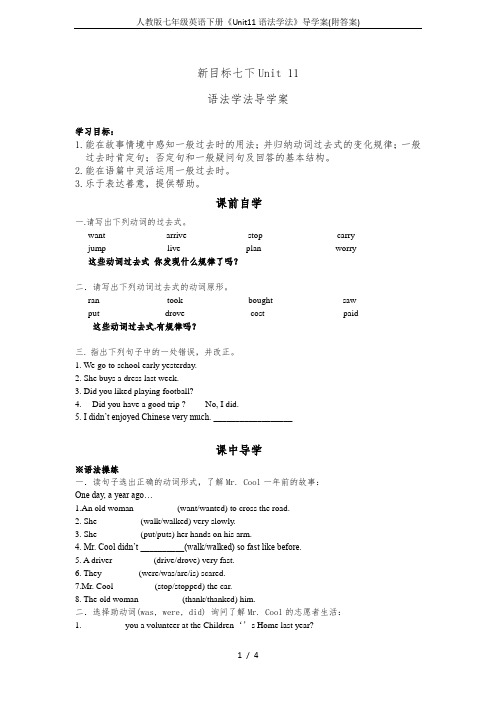
新目标七下Unit 11语法学法导学案学习目标:1.能在故事情境中感知一般过去时的用法;并归纳动词过去式的变化规律;一般过去时肯定句;否定句和一般疑问句及回答的基本结构。
2.能在语篇中灵活运用一般过去时。
3.乐于表达善意,提供帮助。
课前自学一.请写出下列动词的过去式。
want__________ arrive__________ stop__________ carry__________ jump__________ live__________ plan__________ worry _________ 这些动词过去式你发现什么规律了吗?___________________________________________________________________________ 二.请写出下列动词过去式的动词原形。
ran __________ took__________ bought__________ saw__________ put__________ drove__________ cost__________ paid__________ 这些动词过去式,有规律吗?___________________________________________________________________________三. 指出下列句子中的一处错误,并改正。
1. We go to school early yesterday. _____________________2. She buys a dress last week. ________________________3. Did you liked playing football? ________________________4.--- Did you have a good trip ? --- No, I did. ______________________5. I didn’t enjoyed Chinese very much. __________________课中导学※语法操练一.读句子选出正确的动词形式,了解Mr. Cool一年前的故事:One day, a year ago…1.An old woman__________(want/wanted) to cross the road.2. She _________ (walk/walked) very slowly.3. She _________ (put/puts) her hands on his arm.4. Mr. Cool didn’t __________(walk/walked) so fast like before.5. A driver _________(drive/drove) very fast.6. They ________(were/was/are/is) scared.7.Mr. Cool_________ (stop/stopped) the car.8. The old woman__________(thank/thanked) him.二.选择助动词(was, were, did) 询问了解Mr. Cool的志愿者生活:1. _________ you a volunteer at the Children‘’s Home last year?2. _________ Mr. Cool clean up the beach yesterday?3. _________ Mr. Cool and the old man happy when he watched him?4. _________ Mr. Cool donate blood(献血)last week?5.__________ Mr. Cool at work in 2019?※语法运用一.听志愿者协会的女士采访Mr. Cool并补全对话。
人教版七年级英语下册《Unit11语法学法》导学案(含答案)
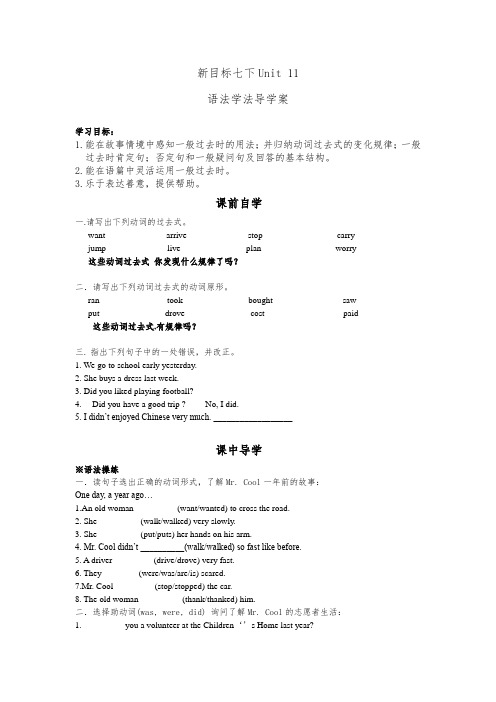
新目标七下Unit 11语法学法导学案学习目标:1.能在故事情境中感知一般过去时的用法;并归纳动词过去式的变化规律;一般过去时肯定句;否定句和一般疑问句及回答的基本结构。
2.能在语篇中灵活运用一般过去时。
3.乐于表达善意,提供帮助。
课前自学一.请写出下列动词的过去式。
want__________ arrive__________ stop__________ carry__________ jump__________ live__________ plan__________ worry _________ 这些动词过去式你发现什么规律了吗?___________________________________________________________________________ 二.请写出下列动词过去式的动词原形。
ran __________ took__________ bought__________ saw__________ put__________ drove__________ cost__________ paid__________ 这些动词过去式,有规律吗?___________________________________________________________________________三. 指出下列句子中的一处错误,并改正。
1. We go to school early yesterday. _____________________2. She buys a dress last week. ________________________3. Did you liked playing football? ________________________4.--- Did you have a good trip ? --- No, I did. ______________________5. I didn’t enjoyed Chinese very much. __________________课中导学※语法操练一.读句子选出正确的动词形式,了解Mr. Cool一年前的故事:One day, a year ago…1.An old woman__________(want/wanted) to cross the road.2. She _________ (walk/walked) very slowly.3. She _________ (put/puts) her hands on his arm.4. Mr. Cool didn’t __________(walk/walked) so fast like before.5. A driver _________(drive/drove) very fast.6. They ________(were/was/are/is) scared.7.Mr. Cool_________ (stop/stopped) the car.8. The old woman__________(thank/thanked) him.二.选择助动词(was, were, did) 询问了解Mr. Cool的志愿者生活:1. _________ you a volunteer at the Children‘’s Home last year?2. _________ Mr. Cool clean up the beach yesterday?3. _________ Mr. Cool and the old man happy when he watched him?4. _________ Mr. Cool donate blood(献血)last week?5.__________ Mr. Cool at work in 2019?※语法运用一.听志愿者协会的女士采访Mr. Cool并补全对话。
初中语法课教案导入
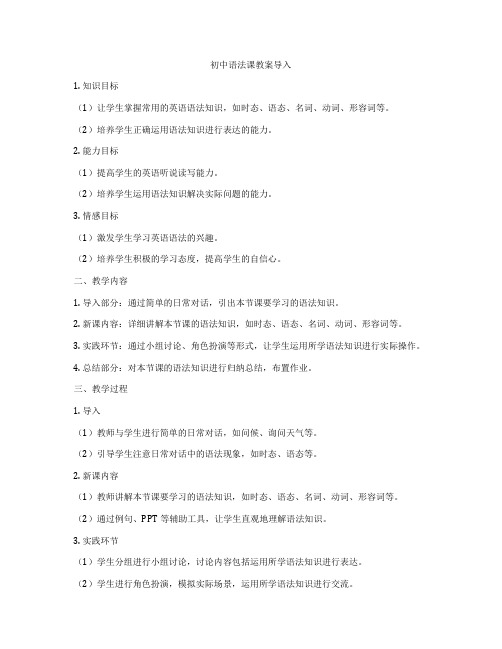
初中语法课教案导入1. 知识目标(1)让学生掌握常用的英语语法知识,如时态、语态、名词、动词、形容词等。
(2)培养学生正确运用语法知识进行表达的能力。
2. 能力目标(1)提高学生的英语听说读写能力。
(2)培养学生运用语法知识解决实际问题的能力。
3. 情感目标(1)激发学生学习英语语法的兴趣。
(2)培养学生积极的学习态度,提高学生的自信心。
二、教学内容1. 导入部分:通过简单的日常对话,引出本节课要学习的语法知识。
2. 新课内容:详细讲解本节课的语法知识,如时态、语态、名词、动词、形容词等。
3. 实践环节:通过小组讨论、角色扮演等形式,让学生运用所学语法知识进行实际操作。
4. 总结部分:对本节课的语法知识进行归纳总结,布置作业。
三、教学过程1. 导入(1)教师与学生进行简单的日常对话,如问候、询问天气等。
(2)引导学生注意日常对话中的语法现象,如时态、语态等。
2. 新课内容(1)教师讲解本节课要学习的语法知识,如时态、语态、名词、动词、形容词等。
(2)通过例句、PPT等辅助工具,让学生直观地理解语法知识。
3. 实践环节(1)学生分组进行小组讨论,讨论内容包括运用所学语法知识进行表达。
(2)学生进行角色扮演,模拟实际场景,运用所学语法知识进行交流。
4. 总结部分(1)教师对本节课的语法知识进行归纳总结。
(2)布置作业,让学生巩固所学知识。
四、教学策略1. 采用直观、生动的教学手段,如PPT、例句等,帮助学生理解语法知识。
2. 创设实际场景,让学生在实践中运用所学语法知识。
3. 采用分组讨论、角色扮演等形式,激发学生的学习兴趣,提高学生的参与度。
4. 注重个体差异,给予每个学生充分的关注和指导。
五、教学评价1. 课堂表现:观察学生在课堂上的参与程度、发言情况等。
2. 作业完成情况:检查学生对所学语法知识的掌握程度。
3. 实践环节表现:评价学生在实际场景中运用语法知识的能力。
六、教学反思在课后,教师应认真反思本节课的教学效果,针对学生的反馈情况进行调整教学策略,以提高教学效果。
7A8单元语法导学案

GrammarLearning Aims(教学目标):1. 掌握现在进行时态的含义和结构。
2.掌握现在分词的变化规则。
3.能够使用现在进行时态描述正在发生的事情。
Useful phrases and expressions:write (a letter) to sb 给某人写信lie on the bed躺在床上practice with sb 与某人一起练习wait fo r 等待look for寻找Learning Procedures:一.阅读课本122页关于现在进行时态的内容,了解现在进行时态的含义和结构。
掌握现在分词的变化规则并.能够使用现在进行时态描述正在发生的事情。
现在进行时态:1.定义:现在进行时表示说话时进行或发生的动作,也可表示的活动或的动作。
2.标志词:(1) 时间状语、at the moment(2) 句前有提示词、、look at …、be quitedon’t talk 、it’s+时间(3)有表示的上下文语境3.谓语动词的构成:+动词- (动词的)注意:see-seeing draw-drawing listen-listening现在分词构成口诀现在分词很好记,动词后缀- 。
直接加、、双写加。
还有一点要注意要用来代替。
现在进行时用法口诀主语在前在后,跟着走,其他成分不可丢。
变一般很简单,把be 提到句子,否定句也不难,be后要把添。
还有一点要注意,动作提问doing替。
现在进行时态练习题:1.写出下列动词的现在分词形式。
help come swim eat givefind sit wait tie makeplay clean catch walk riderun draw listen begin dance watch sleep see have write2.汉译英。
①.我们正在看电视。
We TV.②.Tom 在图书馆看书。
Tom books in the library.③.康康在操场上打篮球。
(完整版)七年级英语期中语法(时态)复习导学案
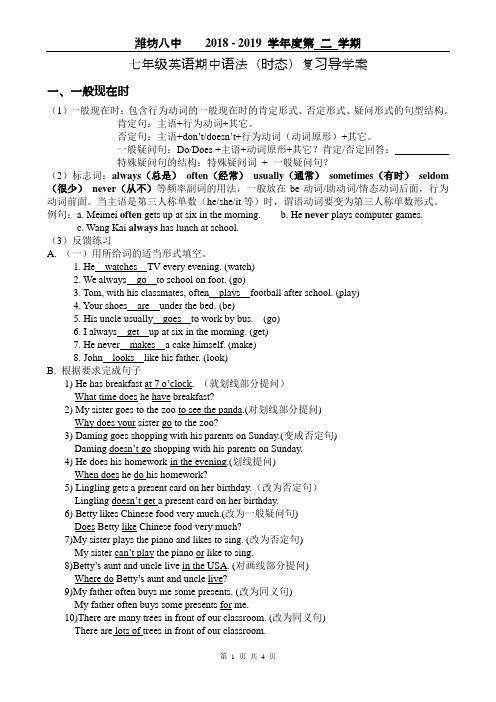
七年级英语期中语法(时态)复习导学案一、一般现在时(1)一般现在时:包含行为动词的一般现在时的肯定形式、否定形式、疑问形式的句型结构。
肯定句:主语+行为动词+其它。
否定句:主语+don’t/doesn’t+行为动词(动词原形)+其它。
一般疑问句:Do/Does +主语+动词原形+其它?肯定/否定回答:特殊疑问句的结构:特殊疑问词+ 一般疑问句?(2)标志词:always(总是)often(经常)usually(通常)sometimes(有时)seldom (很少)never(从不)等频率副词的用法,一般放在be动词/助动词/情态动词后面,行为动词前面。
当主语是第三人称单数(he/she/it等)时,谓语动词要变为第三人称单数形式。
例句:a. Meimei often gets up at six in the morning. b. He never plays computer games.c. Wang Kai always has lunch at school.(3)反馈练习A. (一)用所给词的适当形式填空。
1. He watches TV every evening. (watch)2. We always go to school on foot. (go)3. Tom, with his classmates, often plays football after school. (play)4. Your shoes are under the bed. (be)5. His uncle usually goes to work by bus. (go)6. I always get up at six in the morning. (get)7. He never makes a cake himself. (make)8. John looks like his father. (look)B. 根据要求完成句子1) He has breakfast at 7 o’clock. (就划线部分提问)What time does he have breakfast?2) My sister goes to the zoo to see the panda.(对划线部分提问)Why does your sister go to the zoo?3) Daming goes shopping with his parents on Sunday.(变成否定句)Daming doesn’t go shopping with his parents on Sunday.4) He does his homework in the evening.(划线提问)When does he do his homework?5) Lingling gets a present card on her birthday.(改为否定句)Lingling doesn’t get a present card on her birthday.6) Betty likes Chinese food very much.(改为一般疑问句)Does Betty like Chinese food very much?7)My sister plays the piano and likes to sing. (改为否定句)My sister can’t play the piano or like to sing.8)Betty’s aunt and uncle live in the USA. (对画线部分提问)Where do Betty’s aunt and uncle live?9)My father often buys me some presents. (改为同义句)My father often buys some presents for me.10)There are many trees in front of our classroom. (改为同义句)There are lots of trees in front of our classroom.二、现在时进行时(1)现在进行时:表示正在进行和发生的动作。
内蒙古乌拉特中旗一中高一英语人教版语法导学案:句子的主语和谓语

教学流程设计
及探究设计点拨
教学目标:1.认识句子的主语和谓语;
2.认识句子的宾语。
(复制学生用导学案内容)
课前预习:通过前面的句子练习总结句子成分:
——————————————————————
课内探究:
1.站在大树下穿着粉红衣服的高个子女孩来自美国。
2.昨天下大雨的时候,他正在回家的路上。
14.To get to school early is his habit.
15.I try to talk to my classmate.
16.We often do homework together.
17.I don’t want to end the friendship.
18.I hate others gossiping.
6.Mary ignores the bபைடு நூலகம்ll.
小结:
课后作业:1.标出下列句子中的主语、谓语和宾语:
1)She couldn’t meet her friends.
2)Ann kept a diary because she could told everything to it.
3)The old man entered the room helped by his grandson.
当堂检测:
1.He broke a glass.
2.He experienced lots of difficulties.
3.I wash my face three times a day.
4.We want to see an interesting film.
5.Lily plans to go shopping.
语法第一,二讲名词(导学案Cherry)

语法第一,二讲名词(导学案Cherry)第一讲名词(导学案)全名:巧学妙用:一、名词的定义:2。
名词分类:12.a.a.b.b.a.b.三、名词数量:1.可数名词和不可数名词的分辨:一般常见的不可数名词有:2.可数名词a.可数名词单数变复数规则变化(并举例):①②③④⑤b.可数名词单数变复数不规则变化(并举例):①②③④⑤⑥⑦3.不可数名词a.常考的不可数的名词:b、既可作可数名词又可作不可数名词的名词:四.名词的格:1.有生命的:单数名词(并举例):A.b.C复数名词(并举例):a、 b.2。
无生命(示例):of结构:to结构:大师之手的第一个小显示屏:1.---wouldyoulikesomethingtodrinkbilly?---yes,i’dlikesome____________.a.meatb.ricec.waterd.bread2.janeeatsa_________.a、面包。
米尔克。
汉堡。
肉3。
--先生,您想要什么我喜欢两杯水。
两杯水。
两杯水。
两杯水4.---___________weather!it’sraining.---badluck!wecan’tgoforapicnictoday.a.whatabadb.whatbadc.whatgoodd.whatagood5.we needa/an______tomakeadecision(决定).a、信息B。
advicec。
艾德。
新闻6。
这是一个家庭的照片。
a.bobb.bobsc.bob’sd.bobs’7.theroomisthose________livingroom.a、 twinsb。
双胞胎姐妹。
双胞胎的8岁姐妹英语老师。
a.jimandkateb.jim’sandkate’sc.jim’sandkated.jimandkate’s9.findtheanswer___ _____thequestion,please.a.ofb.withc.tod.for10._______;是上映的动作片a.peopleb.peoplesc.thepeopled.thepeoples快乐突破:1.it’sverydifficulttofinda______(job/work)atthemoment.2.托曼和吉玛他们的孩子。
- 1、下载文档前请自行甄别文档内容的完整性,平台不提供额外的编辑、内容补充、找答案等附加服务。
- 2、"仅部分预览"的文档,不可在线预览部分如存在完整性等问题,可反馈申请退款(可完整预览的文档不适用该条件!)。
- 3、如文档侵犯您的权益,请联系客服反馈,我们会尽快为您处理(人工客服工作时间:9:00-18:30)。
例句:兔子要吃胡萝卜。翻译:___________________________________.
→变被动句:___________________________________________________.
S④V②①O③C①宾语变为主语,宾格变主格
He will be asked to help you ( by us).③宾补不变
六,注意事项
1.在时间、条件状语从句中,应用一般现在时的被动语态表示将来时的被动语态。例如:
If I am given enough time, I will go toGreecefor my holiday.
4. Can you tell me by whom this lecture ______ this afternoon?
A. is given B. will be given C. will give D. be given
三,用法:
1.表示根据计划或者安排将要发生的被动性动作。如:
Those books will be published next month.那些书将于下月出版。
This work will be done at once.这项工作将立即被完成。
2.表示有固定性条件就有规律性被动结果。如:
Heated to100℃, water will be turned into steam.加热到100度时,水将会变成蒸汽。
运动会将于四月十日举行。翻译:_____________________________________________
表示“应该”,相当于should,可用来征求对方意见。
The flowers are to be watered soon if you want to keep them alive.
3.短语动词变被动语态时不能漏掉介词或副词。例如:
【误】The old buildings will be pulled next week.
【正】The old buildings will be pulled down next week.
【误】The little girl will be taken care by the old man.
第七八课时:Grammar:the Future Passive Voice.
主备人:张立靖文建卫王艳行授课人:授课时间:
学习目标:1.自主学习,合作探究,认识并掌握一般将来时的被动语态。
2.能够在听、说、读、写的语言综合实践活动中熟练运用一般将来时被动语态。
3.灵活使用被动语态组织句子。
重难点:如何让学生更好的掌握一般将来时的被动语态的结构和用法以及如何培养学生自主学习和提高学生对语法学习的兴趣。
If you park your car here, you will be fined.如果你将车停在这儿,你将被罚款。
四,其常用表达形式有以下几种:
1.will / shall + be + done,表示将来要发生的被动动作,常用于口语。
We shall be punished if we break the rule.要是咱们违反规定,咱们将要受到处罚
完成下面的句子:
1. In some parts of the world, tea________________(serve) with milk and sugar.
2. A new railway______________________(build) at present.
3. Visitors __________________(request) not to take photos here.
你的家庭作业必须在星期四前上交。翻译:_____________________________________
④be about to be done常用来表示马上就要发生的被动动作。
The polluted water is about to be cleaned.被污染的水源即将被净化。
工人将要去粉刷那堵墙。翻译:________________________________________________
【正】A new film will be shown at the cinema nextweek.
【误】Is this bridge going to completed before the end of this year?
【正】Is this bridge going to be completed before the end of this year?
如果我有足够的时间,我将去希腊度假。
I need one more stamp before my collection is completed.
再有一张邮票我的收藏就完整了。
2.使用一般将来时被动语态时,学生易遗漏被动式中的be。例如:
【误】A new film will shown at the cinema next week.
这个问题将不会在明天的会议上被讨论。翻译:__________________________________
3.be to + be + done
表示按计划或安排将要发生的被动动作。
Are these machinesnot to be repaired tonight?今晚将不会修理这些个机器吗?
A. will be built B. will build C. is going to build D. was built
3. An English play ______ in our school this weekend.
A. is put on B. will be put on C. Will be put D. has been put on
五,一般将来时主动语态变被动语态的方法:
⑴He will plant more trees. (主语+谓语+宾语)
S③V②O
①①将宾语提前变主语
②将谓语动词变为被动结构
More trees will be planted by him.③将主语变为人称代词宾格,放在介词by后
⑵Lily will show me some photos. (主语+谓语+间宾+直宾)
巩固案Building-up case
1.The 2016 Olympic Games ______ in Rio de Janeiro(里约热内卢), Brazil.
A. hold B. are to hold C. is to be held D. are held
2. New buildings and sports venues ______ for the Beijing Olympic Games.
→变被动句的否定句:___________________________________________.
→变被动句的一般疑问句:_______________________________________?
肯定回答:________,____________.
→变被动句的特殊疑问句(对划线部分提问):____________________________________?
S③②VO1①O2④①将间宾提前变为主语
②将谓语动词变为被动结构
⑤③将主语放在介词by后
I will be shown some photos by Lily.④将直宾提前变主语
Some photos will be shown to me by Lily.⑤ቤተ መጻሕፍቲ ባይዱ间宾前加介词to或for
⑶We will ask him to help you. (主语+谓语+宾语+宾补)
⑸We shan’t be asked to be there before eight.
⑹Theywon’t be stopped outside the stadium. They have tickets.
⑺ShallIbe admittedinto the stadium?
⑻Willhebe cheeredup by the watchers when competing in the race?
预习案Previewing case
Can you find out the new grammar point in these sentences? Underline them.
⑴Only athletes who have reached the agreed standard for their eventwill beadmittedas competitors.
2._______________________________________________
二,构成
其基本构成为:主语+__________________________,其中______常用于第一人称,will用于各种人称。其否定式为:主语+_________________+be+done (will not缩写为:_______shall not缩写为:________ ) .其一般疑问句式为:_________+主语+be+done ?简略回答Yes,主语+__________.No,主语+___________.
⑵And after that the 2012 Olympicswill be heldinLondon.
